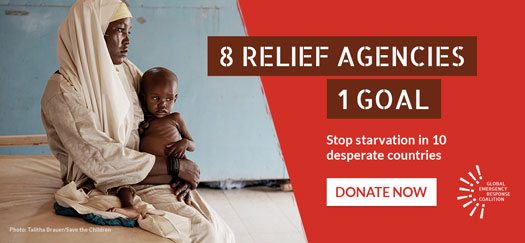
July 18, 2017; New Hampshire Public Radio
Can a collaboration between the country’s largest nonprofits inspire Americans to care about a looming famine in the Horn of Africa? These U.S.-based NGOs are forming a coalition to raise money and awareness of what could be the world’s largest humanitarian crisis since World War II in Southern Sudan, Nigeria, Somalia, and Yemen, where a cholera epidemic has sickened more than 300,000 people in three months.
“More than 20 million people face starvation in the coming months and, without immediate help, 1.4 million severely malnourished children could die,” Coalition leaders said in a press release launching a two-week appeal. “The Global Emergency Response Coalition will use Hunger Relief Fund donations to help those already going hungry and on the brink of famine survive and lay the groundwork for recovery. The coalition is comprised of CARE, International Medical Corps, International Rescue Committee, Mercy Corps, Oxfam, Plan International, the Children and World Vision.”
The Coalition also reported early corporate support from several sources, including the PepsiCo Foundation and BlackRock, which will match donations up to $1 million. Star power was provided by George Clooney, who narrated a public service announcement on YouTube.
But, individual donors could be a tougher sell. While rage donating to causes like the ACLU and Planned Parenthood is trending in post-election America, international issues receive less attention. As NPR reported, even UNICEF leader Justin Forsyth acknowledged the challenging fundraising climate and donor fatigue:
Sign up for our free newsletters
Subscribe to NPQ's newsletters to have our top stories delivered directly to your inbox.
By signing up, you agree to our privacy policy and terms of use, and to receive messages from NPQ and our partners.
“Politicians around the world are very focused domestically on politics at home, not on international issues,” Forsyth told NPR. “In addition, some of the public fear that their aid money hasn’t really made a difference when they’ve provided it before.”
Further, many of the issues exacerbating the crisis in Africa are manmade, as NPQ reported earlier this year:
South Sudan has a great deal of oil. However, it has not been able to capitalize on its wealth due to ongoing conflicts among leaders and ethnic groups as well as the lack of modernization in its industry… (the country) actually has a large amount of arable land, and 85 percent of its people rely on agriculture for their livelihood… However, according to the African Development Bank, the lack of modernized techniques, the difficulty of market access, the lack of farmer associations that can provide loans and stabilize prices, and the uncertainty of property rights force farmers to operate at a subsistence level rather than for market production, leaving them unable to build long-term wealth.
While it’s unclear how the Coalition will divide the funds raised, or whether the collaboration will impact operations on the ground, it’s heartening to see a new approach to an old problem. As NPQ writer James Schaffer asked just last month, “Can we rise above the roiling debate about overhead, the ever-increasing number of nonprofits, donor retention, the consolidation of wealth, and all the rest of it for the sake of this crisis?”
With increased interest nationally in one of the effects of the famine—the global refugee crisis—perhaps the time is right for us to care about people a world away.—Anna Berry











